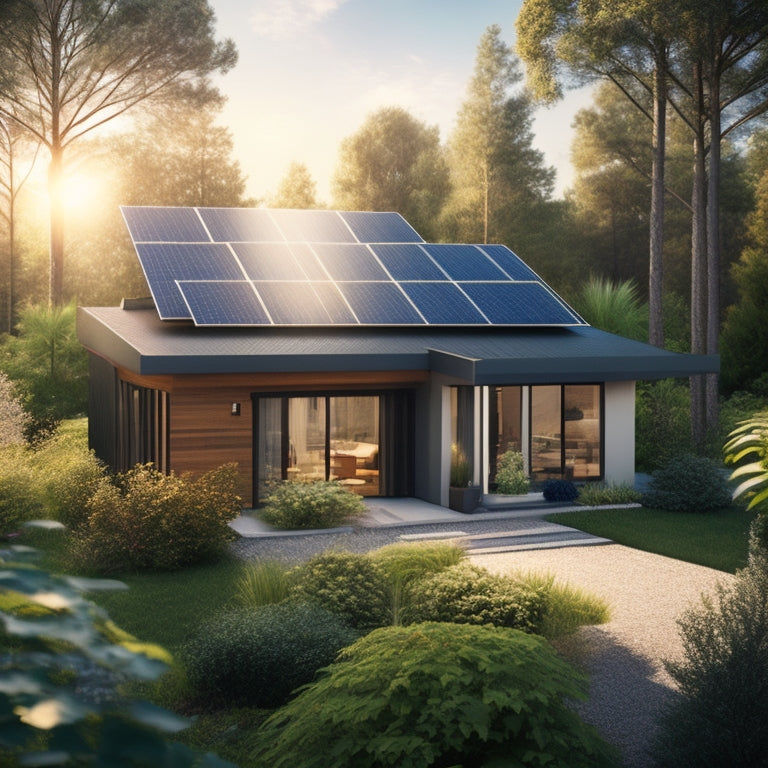
Boosting Energy Efficiency With Government Grants
Share
You can boost energy efficiency in your commercial building by leveraging government grants to offset the costs of energy-efficient upgrades. To qualify, your building must meet energy consumption benchmarks, comply with local building codes, and adhere to energy efficiency standards. Familiarize yourself with the grant application and approval process, ensuring alignment with government goals and meeting eligibility criteria. By tapping into these grants, you can make achieving your sustainability goals more feasible. Explore the opportunities and criteria for government grants, and discover how you can optimize your energy efficiency and sustainability efforts.
Key Takeaways
• Government grants can offset costs of energy-efficient upgrades, making sustainability goals more feasible for commercial buildings.
• Eligibility for grants requires meeting energy consumption benchmarks, complying with local building codes, and adhering to energy efficiency standards.
• Successful grant applications align with government goals, meet eligibility criteria, and respond promptly to application reviews.
• Energy-efficient upgrades, such as insulation and energy audits, can reduce energy consumption and lower bills, with grants helping to cover costs.
• Government incentives, like carbon pricing and green bonds, encourage businesses to invest in energy-efficient solutions, like solar panels, to reduce their carbon footprint.
Government Incentives for Energy Savings
What government incentives are available to support your energy-efficient endeavors, and how can you tap into them to maximize your savings?
As a building owner, you can benefit from various government incentives designed to promote energy efficiency. For instance, carbon pricing mechanisms, such as carbon credits and taxes, can encourage you to reduce your carbon footprint.
Additionally, green bonds, which are specifically used to finance environmentally friendly projects, can provide access to funding for energy-efficient upgrades. By leveraging these incentives, you can offset the costs of energy-efficient upgrades, making it more feasible to achieve your sustainability goals.
Eligibility Criteria for Commercial Buildings
To qualify for government grants and incentives for your commercial building, it must meet specific eligibility criteria. These typically include energy consumption benchmarks, project scope, and compliance with local building codes. You'll need to verify that your building adheres to the latest building codes, zoning regulations, and energy efficiency standards. This includes achieving energy consumption targets, such as reducing energy usage by a certain percentage.
Additionally, your project scope should outline specific energy-saving measures, like installing LED lighting or upgrading HVAC systems. By meeting these criteria, you'll be well on your way to securing government grants and incentives to support your energy-efficient upgrades.
Grant Application and Approval Process
You'll need to put together a thorough grant application package that includes detailed project plans, energy audits, and cost estimates to increase your chances of securing government funding. To navigate the grant application and approval process, understanding the following key aspects is crucial:
-
Application Timeline: Be aware of the application deadlines and plan accordingly to avoid last-minute rushes.
-
Funding Cycles: Familiarize yourself with the funding cycles and allocate your resources accordingly.
-
Eligibility Requirements: Make sure you meet the eligibility criteria, and your project aligns with the government's energy efficiency goals.
- Application Review Process: Be prepared for a thorough review of your application, and be responsive to any requests for additional information.
Energy Efficient Upgrades for Buildings
Implementing energy efficient upgrades in buildings can greatly reduce energy consumption, lower energy bills, and minimize environmental impacts. As you consider upgrades, you'll want to prioritize building insulation, an essential aspect of energy efficiency.
Proper insulation can reduce heat loss in the winter and heat gain in the summer, minimizing the need for heating and cooling. To identify areas for improvement, conduct an energy audit, a thorough assessment of your building's energy usage. This will help you pinpoint energy-wasting areas and create a roadmap for upgrades.
With a clear plan in place, you can take advantage of government grants to offset the costs of your upgrades, ensuring a more efficient and sustainable building.
Maximizing ROI With Solar Panels
One of the most effective ways to maximize your return on investment (ROI) is by harnessing the power of solar energy, which can greatly reduce your building's reliance on the grid and generate substantial long-term savings.
By installing solar panels, you can greatly reduce your energy bills and even earn revenue through net metering. To maintain peak performance, regular Solar Maintenance is essential to prevent energy losses and extend the lifespan of your system.
Additionally, contemplate investing in Energy Storage solutions to store excess energy generated during the day for use during peak hours or at night.
Here are four key benefits to ponder:
-
Increased Energy Independence: Reduce your reliance on the grid and generate clean energy on-site.
-
Substantial Cost Savings: Lower your energy bills and potentially earn revenue through net metering.
-
Environmental Benefits: Contribute to a cleaner environment by reducing your carbon footprint.
- Government Incentives: Take advantage of government grants and incentives to offset the cost of installation.
Frequently Asked Questions
Can Non-Profit Organizations Apply for Government Energy Grants?
You can apply for government energy grants as a non-profit organization, but you'll need to meet the Eligibility Criteria, which typically involves thorough Grant Writing, to increase your chances of securing funding.
Are Energy-Efficient Appliances Eligible for Grant Funding?
As you picture a kitchen filled with eco-friendly gadgets, you wonder if energy-efficient appliances are eligible for grant funding. Yes, they are! Look for appliances with the Energy Star label, as they often qualify for Appliance Incentives and government grants.
Can I Apply for a Grant if I've Already Started the Project?
You'll typically need to apply for a grant before starting your project, as funding retroactivity is rarely allowed. Check the project timeline and application deadlines to make sure you're eligible, as grants usually don't cover in-progress or completed projects.
How Long Does It Take to Receive Grant Funding After Approval?
"Receiving grant funding after approval is like waiting for a carefully crafted recipe to unfold - it takes time. You'll typically wait 3-6 months for grant processing, with funding timelines varying depending on the agency and project complexity."
Are There Any Tax Implications From Receiving a Government Grant?
As a grant recipient, you should be aware that receiving a government grant may have tax implications, increasing your tax liability and audit risk, requiring accurate financial reporting to minimize potential issues.
Related Posts
-

5 Efficient Air Circulation Methods for Green Homes
You can utilize the power of natural ventilation techniques, whole house fans, and solar-powered ventilation systems ...
-

3 Earth-Loving Furniture Tips for Energy-Smart Homes
When furnishing your energy-smart home, you have the power to reduce your carbon footprint greatly by making consciou...
-

10 Eco-Friendly Air Management Tools for Clean Home Living
You're taking an essential step towards creating a healthier living space by seeking eco-friendly air management tool...


